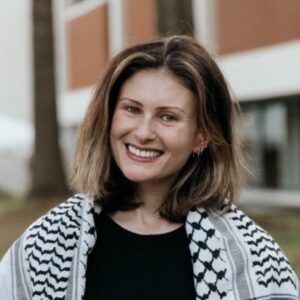Being a Palestinian-American student during a genocide
January 29, 2024

Catie Haddad
OPINION by CATIE HADDAD
I spent much of the first three years of my life at my teta and jidu’s home in San Luis Obispo. In their backyard, they had a large garden with every fruit and vegetable variety imaginable. As my jidu and I would walk around the garden identifying different plants, I noticed everything from cherries, figs, grapefruit, and watermelon to avocados, zucchini, and edible flowers that he would incessantly encourage me to try.
One summer, jidu chopped down one of the garden’s palm trees for the heart of palm, something my 9-year-old, suburban Californian self found both strange and exciting.
My teta and I would spend hours searching the patio for ladybugs as my grandparents’ pomeranian, Jolie, played with her toys. When I think of their garden now, I feel grateful that they were able to have a sliver of homeland in their California backyard–– that for a second when they woke up and looked out the window in the morning, they would be able to imagine they were not in San Luis Obispo, but instead were in Baghdad or Haifa.
When I think of my teta and jidu now, I think of the way my mixed identity has allowed me to grow up without certain Western biases. My jidu was Iraqi and Muslim and my teta was a Palestinian-Lebanese Christian, but to me, even though I was half white and American, they were simply my grandparents.
In their garden and at their home, they taught me how to look at mundane objects and moments with tremendous love, curiosity, and humanity. Now, I advocate for Palestine and for the universality of human rights because of this love––my love for humanity has fueled my belief that if everyone had access to the information I have used to learn about Palestine, they would naturally reach the same conclusions as I have.
They would come to view Palestinians not as a population of terrorists, but as a people who have been occupied, displaced, and terrorized for years in their ancestral homeland. They would see Palestinians as human beings who deserve to live as much as anyone else. They would mourn the deaths of Palestinians as they do the deaths of Ukrainians. They would also come to learn, I believe, that Palestinian resistance is fueled by Palestinians’ profound love for their land and their culture, which are inextricably linked.
Opening their eyes and hearts, they would no longer see those tending to thousand-year-old olive trees as the aggressors, but rather those bulldozing them.
Over the past three months, I have felt around me a growing sense of cognitive and emotional dissonance. It is difficult to remain socially and academically engaged in a reality where my ethnic identity circumscribes the feelings I’m allowed to express. I often think that if I was not Palestinian- or Arab-American – if I was Ukrainian or from another ethnic group whose pain the West views as legitimate – the only thing I’d be doing right now would be grieving and resting.
This is not my reality. Instead, I must first attempt to assist my peers in recognizing my humanity and the humanity of my people.
I have put my thoughts on this page to process what is happening and to bring others into this processing. Every day, I think about different avenues and ways of getting my peers involved in the Palestinian liberation movement. I think to myself, Palestine might not feel like a natural cause to support for everyone, but I can show them why it is.
I will tell those interested in environmentalism about the ongoing destruction of olive trees, the rampant herbicide attacks unleashed on Palestinian land both pre-and-post-2023, and the weaponization of resources as tools of ecocide. For those who care about women’s rights, I will tell them about how women in Gaza have been taking pills to suppress their menstrual periods because they can’t get sanitary pads due to the siege, or that miscarriages in Gaza have increased 300% over the recent months.”
Each day as I ruminate through these mental exercises, I pose numerous questions to myself: Which is more bearable–violently compromising my morals, my integrity, and my humanity while willingly enabling a genocide in the process, or speaking up and losing a job or friends?
When someone asks me and my peers someday what we were doing during this time, will we feel proud answering “nothing, our hands were tied”? Who has tied our hands, and why can’t we help each other to untie them?
My jidu chopped down the palm tree in his garden to see its heart and its core and to share them with others, knowing that this tree would grow back because he would nurture and tend to it. Right now, I am asking you to perform a similar act of labor and of nurturing: I ask you to cut through some of the defensive tissue that might be preventing you from thinking about, talking about, and advocating for Palestine.
Getting to the heart of this can only be done through love, curiosity, and humanity. It will at first feel strange, but it will also feel exciting, and when we tend to each other during our collective regrowth, we will be a taller and greater force than ever before.
Catie Haddad was born and raised in San Luis Obispo. She is currently a second year law student at the University of Virginia.
Sign up for breaking news, alerts and updates with Cal Coast News Top Stories.






The comments below represent the opinion of the writer and do not represent the views or policies of CalCoastNews.com. Please address the Policies, events and arguments, not the person. Constructive debate is good; mockery, taunting, and name calling is not. Comment Guidelines